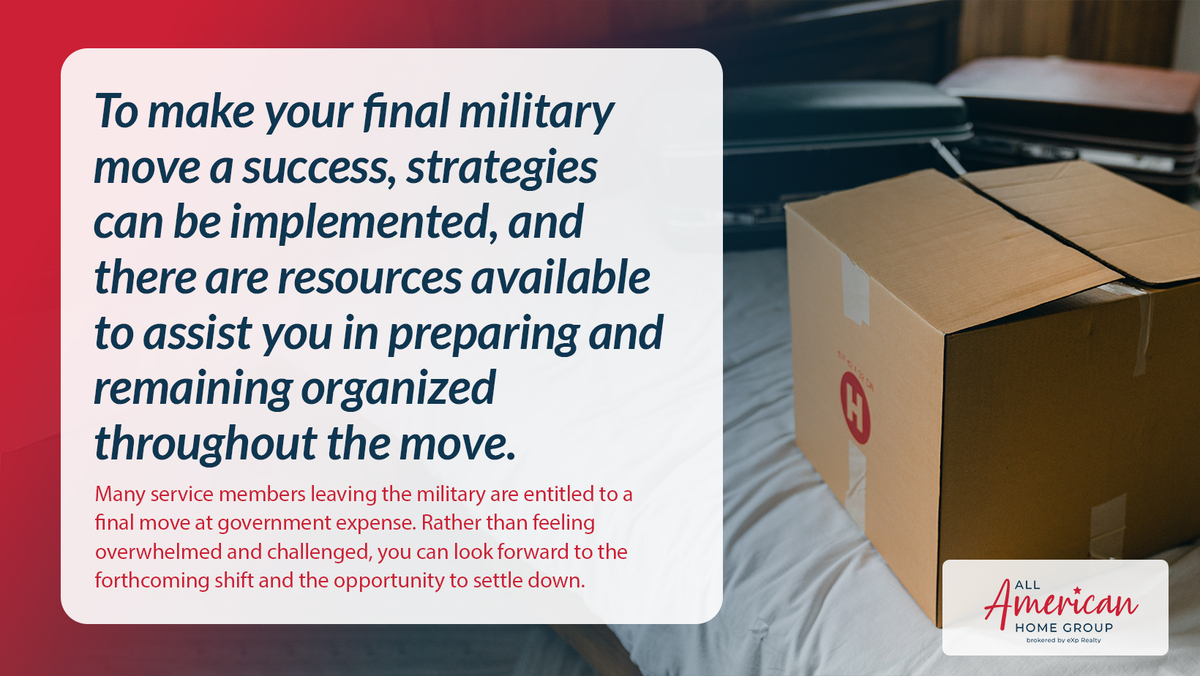Moving to a new place is never easy, but there are some additional challenges when you're in the military and have your orders sent out for the final move. You may need to rush (or not have to rush at all) to your new installation. You might also have other things on your mind as you plan your move. Nevertheless, there are several advantages to your last military move that set it apart from a typical PCS trip.
To make your final military move a success, strategies can be implemented, and there are resources available to assist you in preparing and remaining organized throughout the move.
Many service members leaving the military are entitled to a final move at government expense. Rather than feeling overwhelmed and challenged, you can look forward to the forthcoming shift and the opportunity to settle down.

Does the Military Pay for My Final Move?
Regardless of how long you served in the military, you most likely moved at least once. A final move at government expense is authorized for most service members leaving the military, either at retirement or after their active service separation. Just follow these tips below, and you can make your final move the simplest yet.
If you're leaving the military voluntarily, the government will usually cover one final military transfer up to six months following your final discharge date. However, depending on your destination, you may need to pay a portion of the expense out of your pocket.
In most cases, the military will cover the cost of one final transfer, but it will most likely only cover the cost of moving to your place of record or admission.
However, officials from the Defense Department say that this can vary depending on the situation. A formula determines the amount the Department of Defense will pay for your relocation. This formula considers the amount of weight you're allowed to transport based on your rank and the distance your items are allowed to go.

Will the Military Move Your Spouse?
The good news is that the military will cover the cost of your spouse's relocation as long as you both live in the same house. Depending on how much time off you have, your spouse may be in charge of most moving plans.
Preparing ahead of time, asking the right questions, choosing the right moving company, and speaking with an experienced real estate agent like Elizabeth Straessle, Military Relocation Specialist, may help you complete your military relocation mission.

How Long After Retirement Will the Military Move You?
According to military travel regulations, unless you apply for and receive an extension, your last move must be made within one year of your retirement. Those extensions can be provided for nearly any cause as long as a transportation official approves it. According to regulation, you can request an extension five times, putting your last transfer to six years after your retirement date.
Meanwhile, according to transportation officials, the application of the restrictions, like other entitlements, is at the discretion of the individual services. This implies that, while the law allows for a maximum six-year extension, the services may choose to offer you a shorter one. The best thing you can do is contact your local transportation office for more information.
How Do You Prepare for Military Movers?
Nobody truly understands what you're going through during a military relocation unless they've been in your shoes. It isn't easy to describe to civilians what it's like to relocate your family and pack up your entire life every few years. Here are five tips to keep you organized throughout your final move:
1. Make Sure You’re Well-Informed on Your Benefits
You may be eligible for various perks, including storage of personal belongings, travel allowances, and a per diem. Travel allowances and other final move perks differ by military branch, so contact your installation's Military and Family Support Center, transportation office, Move.mil, or the US Transportation Command website for more information.

2. Make a Binder for Moving
You will require vital documents far more frequently than you ever imagined during a move. Put copies of your orders, birth certificates, social security cards, mortgage documents, rental agreements, and other essential documents in a brightly colored binder with sleeve protectors. You'll feel even more organized than you already are.
3. Packers Are More Critical Than Movers
The majority of folks concentrate on the movers. The skill level of your movers, though, isn't nearly as important as that of your packers.
Professional packers have a lot of experience. They can ensure that your fragile items arrive undamaged. Get to know them. Offer to take them out for lunch. Praise them for the good work they're doing, and they'll do even better.

4. Pack a Box for “The First Night”
When you initially move into your new house, you may have to sleep on the floor for a few nights while waiting for your furniture to arrive. You won't have time to unpack anything if you drive all day and you (and your moving truck) arrive late at night.
A "first-night" box has everything you'll need to comfortably get through the first few days. Here are some of the most important things to remember:
Your first-night box essentials:
- Cleaning materials
- Toilet paper
- Garbage bags
- Sleeping bags
- Bedding and linens,
- Towels for the bath and hand towels
- Other cooking materials you need
When it comes to meals, remember that most of your kitchen things will likely be packed away, and they might even have been already picked up by your movers during your last few days in your old house. You can opt for take-out or easy-to-cook meals that don't require many materials and ingredients, like instant ramen or stir-fries.
5. Speak With a Professional
Professionals at your local Military and Family Support Center can assist you with your relocation. Each transfer is unique, and laws range depending on the military branch and region. Make an appointment with your transportation office or the Military and Family Support Center to learn more about your options.
You can also speak with a Military Relocation Specialist, like me, Elizabeth Straessle. I can lay out several choices and methods to make your final military move go more smoothly.
Find Positive Reasons for Your Final Move
Humans are intrinsically resistant to change, but we must find reasons to be optimistic and accept the change. As a result, you must tell yourself to concentrate on the positive aspects of your decision. Will you be moving closer to your childhood hometown? Are you relocating to a more suitable residence? Are you relieved to no longer have a neighbor who parks his noisy hotrod in front of your house? Look for something to enjoy.
On average, military families have relocated at least twice in their lives. It makes things a little smoother if you take pride in your moving expertise. Since this is your final move, let's make it as simple as possible. Do you want to buy a home in Corpus Christi? Or maybe you're looking for someone to assist you with your Corpus Christi military relocation? Call me, Elizabeth Straessle, your best Corpus Christi real estate agent, at 361-444-3908.

